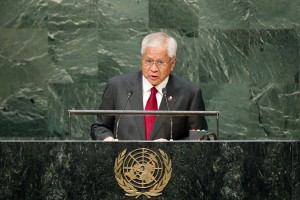KUALA LUMPUR–Southeast Asian leaders hold a summit in Malaysia Monday seeking to maintain unity in the face of differences over how to respond to China’s expanding territorial ambitions at sea.
The Philippines on Sunday challenged fellow members of the Association of Southeast Asian Nations (Asean) to “finally stand up” to Beijing’s assertiveness in the South China Sea.
Philippine Foreign Secretary Albert del Rosario warned his regional peers in a precursor meeting in Kuala Lumpur that China was poised to take “de facto control” of the strategic seaway.
But his Malaysian counterpart Anifah Aman pointedly brushed aside Manila’s call.
“The Philippines is free to issue any statements that they wish. Insofar as Asean’s stand: We want to engage with China,” he said.
Despite regular paeans to regional integration, Asean has a history of failing to reach consensus on any robust response to Beijing.
This is due to its members’ dependence on China’s huge economy for trade, and because not all Asean states have a stake in the maritime disputes.
Asean members Vietnam, the Philippines, Malaysia and Brunei claim parts of the sea.
But Beijing claims nearly all of it, and its increasingly strident territorial assertions have caused concern in the region and beyond.
Limited progress
These concerns were re-ignited this month by satellite photos showing large-scale land reclamation projects that were turning fragile coral reefs claimed by the Philippines into Chinese islands.
The moves raise the specter of permanent Chinese bases far out in the sea from which Beijing can enforce its claim on a waterway rich in energy reserves, fishery resources, and which serves as a vital conduit for much of world trade.
Defense analysts say some of the new islands will be big enough for airstrips and other large facilities.
Asean has pushed China for more than a decade to agree on a code of conduct at sea under which rival claimants would commit to avoiding steps that could inflame the situation.
But actual discussions only started in 2013 and have progressed slowly, with analysts saying Beijing is delaying on agreeing to any rules so that it can buy time to consolidate its foothold.
China has angrily rejected criticism over the land reclamation, saying it can do as it pleases in waters that are its “indisputable” territory.
Malaysian Prime Minister Najib Razak is expected to shift attention at the summit to his plans to formally declare the establishment of an “Asean Economic Community” (AEC) by the end of the year, a deadline set years ago by Asean.
The AEC is a proposed single economic market with free flow of goods, capital and skilled labor across borders.
But Asean diplomats say the vision remains far-off due to significant non-tariff barriers, vested interests, and large development gaps between member-states.
They admit the yearend declaration is merely symbolic.
Muslim-majority Malaysia also plans to push for greater regional cooperation against extremism.
